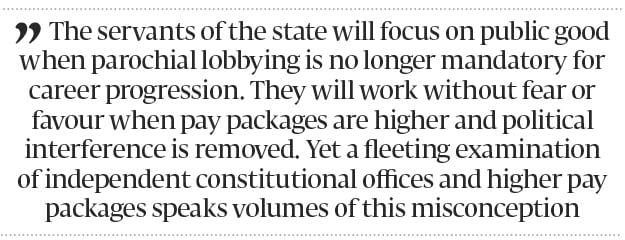The ‘spine-ful’ civil servant
Firm resolution and impartiality are indispensable strengths of a civil servant

The writer is a bureaucrat on a sabbatical
Skeptics suggest that this is Trump’s fate since he is not a classic politician and is subsequently unacceptable to the establishment, which includes the bureaucracy. They may recall a similar situation prior to the 2016 US elections when Comey revived the investigation of Clinton’s emails. The FBI carried out its work despite former President Barack Obama’s ostensible displeasure. Clinton’s defeat in elections may be partly attributed to this investigation. Comey may be a controversial figure but he stands vindicated as an officer legally bound to protect the interest of the state. In comparison, there is little moral justification for the actions of both Trump and Clinton. Comey currently stands on higher ground where he appears to be defending the state against past and present threats. It is the familiar tale of detaching civil service from political masters and their whims and notions.
This act of “spine-fulness” has underscored the fact that independent functioning of institutions is a prerequisite in any form of government. Firm resolution and impartiality are indispensable strengths of a civil servant. It also highlights that ethics and morality are not injectable. The spine cannot be inserted artificially and neither does it grow naturally in adulthood. In Pakistan, a large number of civil servants remain detached from the state while bending over backwards to attach themselves with the government. Be that as it may, there is growing demand for civil service reform to resuscitate morality and ensure objectivity and neutrality in government functionaries.
It is believed that the absence of constitutional protection for civil servants steers the perennial sequence of corruption, poor governance and restricts their ability to function independently. The rationale of this theory is as puzzling as the chicken and egg conundrum. There is no evidence to show that permanently protected employees work better than temporary counterparts. On the contrary, existing evidence shows that contract based employment produces better results. Attributing underperformance to impermanence is misplaced logic. Any deviation from the established path commonly causes denial of due promotions, frequent transfers, banishment to the boondocks (read: rural Sindh or Balochistan), average or insulting evaluation reports and multiple other retributions. There is the everlasting tarnish on career prospects. The officer on special duty (OSD) sword hangs over the head and many are made to meet their nemesis, not unlike Comey.

Civil servants are a means to an end and form a critical bond between the citizen and the state. In Pakistan, the bureaucracy is the weakest link. Public service or greater good are obscure objectives as the bureaucrat struggles to survive and thrive. The purpose of good governance is often lost in translation of the envisaged role. According to many civil servants, the above misfortunes can be addressed if the civil servants’ job is protected. The servants of the state will focus on public good when parochial lobbying is no longer mandatory for career progression. They will work without fear or favour when pay packages are higher and political interference is removed. Yet a fleeting examination of independent constitutional offices and higher pay packages speaks volumes of this misconception.
Heads of constitutional offices have remained equally subservient to political or military masters. They may be as apathetic or corrupt as the next officer. The performance is similarly dismal. In fact, due to the independence bestowed within these select positions the performance is even more abysmal. In a similar vein, there is no reduction in corrupt practices in organisations that offer higher pay or market-based salaries. The myth of increase in salaries to reduce corruption is thus shattered. Ethics and morality are not matters of permanent jobs or higher salaries. These are certainties of the mind and perhaps more so of the soul itself. A hackneyed reference to Faustus is therefore imperative.
So where does the bureaucracy in Pakistan stand? This is a rhetorical question. Most civil servants do not stand and remain bent in one direction or another. Rumour has it that the spine is removed at the outset. In the meantime bureaucrats keep spinning the yarn that spontaneous regrowth of the spine is possible. This requires higher salary, constitutional protection, tenure security, swift promotions, equitable distribution of authority and such-like fiction. However, even if one is to indulge in these impulses, there remains the fact that grown men and women cannot be submerged in potions of ethics and morality to change character. They cannot grow spines or order temporary ones online for artificial insertion. There are no easy answers but some clues are available in the Trump-Comey saga. Navel-gazing has to be replaced with introspection if the weakest link wishes to reclaim its lost stature.
Published in The Express Tribune, June 17th, 2017.
Like Opinion & Editorial on Facebook, follow @ETOpEd on Twitter to receive all updates on all our daily pieces.
















COMMENTS
Comments are moderated and generally will be posted if they are on-topic and not abusive.
For more information, please see our Comments FAQ